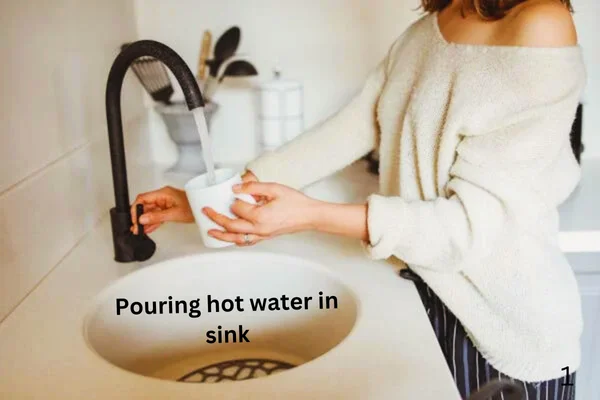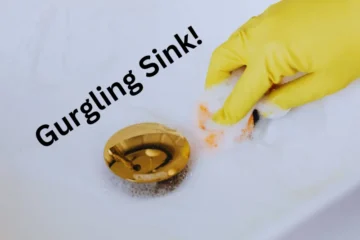Are You Wondering Is it Safe to Pour Boiling Water Down the Kitchen Sink? In every household, kitchen sinks serve as one of the primary centers of activity – from washing dishes and disposing food scraps, all the way to unclogging drains with boiling water. As part of its routine maintenance or unblocking the drain, pouring boiling water down drains may seem like a viable way of clearing grease or food debris that has built up within pipes – however many consider pouring hot water through as safe a method as possible. In this article we explore its risks as well as benefits as safer alternatives in using boiling water in kitchen sinks.
Table of Contents
What Happens When You Pour Boiling Water Down the Sink?
In order to determine whether pouring boiling water down your kitchen sink is safe, it’s essential that you understand how hot water enters your plumbing system when entering through drainpipes or main sewer lines. As it travels down through this journey it may come in contact with various materials – plastic pipes and metal ones alike as well as plumbing joints – along with any debris blocking them (like grease).
Effects on Plastic Pipes
If your plumbing system relies on plastic piping (like PVC), pouring hot water down a drain may damage them over time. Overexposure to boiling water could weaken and eventually crack plastic piping; its intense heat could soften its composition making it more susceptible to cracking or warping than before; although plastic piping was designed for handling higher temperatures at times like this.
Effects on Metal Pipes
Pouring boiling water down the sink may pose less of a threat than usual when using copper piping, since copper’s ability to tolerate extreme temperatures makes it more durable than its alternatives. But over time, repeated exposure could corrode these seals or weaken joints between pipes, possibly leading to leakage problems down the line.
Boiling Water may temporarily help dissolve grease or fats that have solidified in pipes, however this process could cause more severe blockages further down. For instance, pouring boiling water down drains could temporarily liquefy such material before moving further along through its journey and potentially creating severe blockages along its course.
Boiling water may help break up food debris in your sink, but it won’t clear deep or stubborn blockages. Pouring too much boiling water down may push further obstructions further down your pipe system than is desirable.
Risks Associated with Pouring Boiling Water Down the Sink
While pouring boiling water may appear like an easy and quick solution for unclog sink, there are risks you should carefully consider before doing this.
1. Damage to pipe
As previously discussed, pouring boiling water down your sink carries with it significant risks, particularly to plastic pipes commonly found in homes such as PVC. While copper may provide greater resistance, its joints and connections could still suffer over time and damage may result.
2. Personal Injuries
Handling boiling water carries with it significant personal injuries risks, particularly if children or animals live in your house. Being too hasty when pouring hot water down the sink could result in burns or scalds; taking extra caution must always be exercised when handling boiling water by using heatproof gloves and keeping an even hand during handling operations is paramount to safety.
3. Environmental Implications
While using hot water to clear drains may seem eco-friendly, its environmental costs cannot always be ignored. Boiling it often comes from gas or electric stoves which have their own environmental costs incurred from operating, while pouring down hot water may harm local water systems if there are chemicals or oils present that harm their infrastructure.
Benefits of Pouring Boiling Water Down the Kitchen Sink
While pouring boiling water down your kitchen sink can have some risks associated with it, pouring it safely could provide several advantages as long as proper conditions exist for doing it safely and responsibly. Let’s examine these advantages:
1. Breaking Down Grease and Fat
Boiling water can help break up grease build-up in pipes over time, leading to blockages. Boiling water can dissolve this grease quickly so it can be flushed from your drain with minimal hassle if there’s an obstruction near its source. For quick and effective solutions for top of drain clogs this may provide quick relief!
2. Clearing Minor Clogs
To clear away minor food scrap clogs, boiling water could provide the ideal solution. Heat can loosen debris stuck in pipes, permitting more free flow. In case of light blockages such as these, boiling water could provide an easy and affordable way to restore normal drainage systems.
READ MORE: How to unclog a double kitchen sink with standing water?
3. Cleaning and Sanitizing
Boiling water can also help disinfect both the sink and drain by killing off bacteria that might reside within its pipes, thus improving hygiene in your kitchen and decreasing risks for unpleasant odors to come emanating from its drains.
When should You Avoid Pouring Hot Water Down the Sink?
While boiling water might provide quick solutions for certain issues, sometimes it would be wiser not to resort to this approach altogether. Here are a few scenarios when this should occur:
1. When Pipes Are Fragile
To avoid irreparable damage to old, fragile pipes made of materials sensitive to heat sensitivity like certain plastic types or even fiberglass pipe insulation materials like PEX tubing over time from high temperatures such as boiling water pouring down your sink, avoid pouring boiling water down it – over time this could result in leaks or bursts and could potentially pose health hazards to yourself and the public at large.
2. When There Is an Extreme Clog
For severe clogs, boiling water alone will likely not suffice in clearing them away. In particular if they originate deep within your pipes and involve non-organic materials (hair, soap scum, foreign objects), pouring boiling water may only further worsen matters by pushing further blockages down further and pushing further blockages farther.
3. When Your Drain Is Already Leaking
If your pipes or drain are already experiencing leakage issues, pouring boiling water down the sink may make matters worse by weakening joints or seals and leading to further damage. Pouring hot water down could make leakage worsen and potentially create even greater havoc than originally planned.

Safer Alternatives to Pouring Boiling Water Down the Sink
While boiling water may provide temporary relief in certain instances, safer and more effective approaches should always be explored when dealing with kitchen sink clogs or grease accumulation.
1. Baking Soda and Vinegar
A great natural alternative to boiling water can be achieved using baking soda and vinegar, both safe and natural solutions that work quickly in breaking down debris while neutralizing any unpleasant odors from drains. Pour half a cup of baking soda down your drain first followed by half a cup of vinegar; their chemical reaction should help break up debris while eliminating foul smells – allow this combination sit in for 15-30 minutes then flush using warm (not boiling) water before flushing away as normal.
2. Plunger
A plunger can be an indispensable tool in clearing away minor obstructions near sink drains, creating suction action to help dislodge blockages and restore normal drainage – and physically without chemical remedies! It offers one option for dealing with minor blockages.
3. Drain Snake For persistent clogs
A drain snake (commonly referred to as plumber’s auger) may be your go-to tool. With its flexible tip able to reach deeper into pipes than just using plungers or chemical solutions alone can, drain snakes provide access for physically clearing away blockages which have otherwise proven too far for chemical solutions or plungers alone to reach.
4. Enzyme Cleaners
To safely address grease build-up or organic material accumulation in your pipes, enzyme-based drain cleaners provide an alternative. With natural enzymes at their core, these products work without harsh chemicals or high heat to breakdown organic material that clogs pipes.
5. Get Professional Help
To address persistent clogs or serious plumbing problems, always contact a licensed plumber who has all of the appropriate tools and experience necessary for safely solving drain issues quickly and safely.
Conclusion: Is It Safe to Pour Boiling Water Down the Kitchen Sink
Is It Safe to Pour Boiling Water Down the Kitchen Sink? While pouring boiling water down your sink might help with minor clogs and grease buildup, its use carries risk. Boiling water could damage plastic pipes, cause leakage issues or worsen existing severe clogs; older or plastic pipe systems should avoid using boiling water altogether for best results.
Try safer solutions like baking soda and vinegar, plungers or drain snakes instead to address common drainage problems. By understanding potential risks and taking necessary precautions, you can maintain a clog-free kitchen sink while protecting the integrity of your plumbing system.
Always enlist professional plumbers when in doubt or for assistance of any sort. Calling on them ensures the safest and most reliable results.





